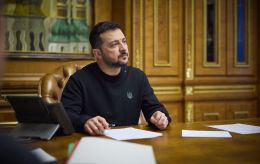Ukraine will become the proving ground for European military innovation — what's behind it
 Photo: Mykhailo Fedorov, Deputy Prime Minister, Minister of Digital Transformation of Ukraine (Vitalii Nosach, RBC-Ukraine)
Photo: Mykhailo Fedorov, Deputy Prime Minister, Minister of Digital Transformation of Ukraine (Vitalii Nosach, RBC-Ukraine)
Ukraine and the European Commission have launched the BraveTech EU initiative. It aims to help test new technologies on the battlefield and attract funding for startups in the defense industry, informs Mykhailo Fedorov, Deputy Prime Minister, Minister of Digital Transformation of Ukraine, and European Commissioner for Defense and Space, Andrius Kubilius, at the Ukraine Recovery Conference in Rome.
The initiative combines the Ministry of Digital Transformation’s BRAVE1 defense technology platform with EU programs, such as the European Defense Fund (EDF) and the EU Defense Innovation Scheme (EUDIS).
The goal is to:
- Stimulate innovation through joint actions;
- Organize hackathons;
- Enable rapid testing;
- Foster direct cooperation between European and Ukrainian companies, especially startups and small and medium-sized enterprises.
Andrius Kubilius said that EU member states have the industrial potential to help Ukraine develop new defense systems and strengthen European resilience.
BraveTech EU will roll out in two phases. The first phase, called Seed, begins in fall 2025. It will build on ED's current activities by strengthening cooperation with Ukraine’s defense innovation ecosystem.
The first phase includes:
- Meetings of software development specialists focused on Ukraine’s defense needs;
- Networking opportunities;
- Building partnerships between Ukrainian and European companies and investors;
- Funding for research and development for startups from Ukraine and the EU;
- Opportunities to test new technologies for EU needs on Ukrainian territory.
Second phase of BraveTech EU
The second phase, Scale Up, will expand first-phase activities. It will use additional resources from EDF and the Ukraine Support Instrument (USI) under the upcoming European Defense Industrial Development Program (EDIP).
Initially, BraveTech EU will receive funding from EDF/EUDIS. Proposed changes to EDF work programs could mobilize up to €50 million. This will match the €50 million committed by the Ukrainian government.
"This is the first major partnership project where we and our European partners will each invest €50 million to create a fund supporting both European and Ukrainian startups," Fedorov said.
He stressed that Ukraine and the EU will jointly seek solutions needed on the battlefield.
"From communication systems required for drones to autonomous technologies using artificial intelligence," the minister explained.
Ukrainian-made weapons
Previously, the Ukrainian company DeepStrikeTech launched the production of a new strike drone called Batyar, visually similar to the Iranian Shahed. It can cover distances of over 800 km.
In addition, in early April, Ukraine tested FPV drones over fiber-optic lines for the first time, achieving a range of over 20 km.

